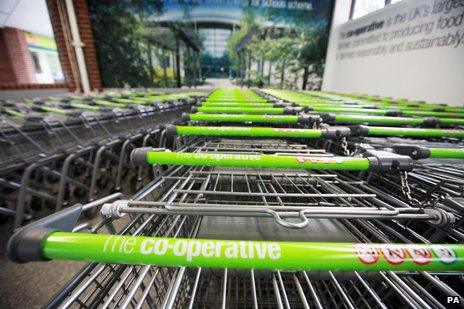The big Co-op question for regulators
- Published
- comments

Here is the big question that city regulators need to answer over their failure to spot how over-stretched and frail Co-op Bank had become.
Or to put it another way, here is a central issue for the independent enquiry to be ordered by George Osborne.
In April of 2012, the Financial Services Authority - precursor of today's Financial Conduct Authority and Prudential Regulation Authority - told Co-op Group that it did not have appropriate management skills and that Co-op Bank had too little capital to be allowed to fulfil its ambition of becoming much bigger by buying more than 600 branches from Lloyds.
I know this, because a senior person at the FSA briefed me about his and his colleagues' serious concerns. You can read the detail of the FSA's instructions to Co-op Group here.
Put in a nutshell, the FSA told Co-op Group to decide whether its future was in banking or in supermarkets. And the presumption at the FSA was that Co-op would choose to stick with supermarkets, and that therefore the takeover of those branches would not happen, that the deal had been killed.
However, just three months later, Lloyds and Co-op Group announced precisely the opposite - that Co-op Group had emerged as the preferred new owner of the branches, in a £750m deal.
And the chancellor of the exchequer, no less, hailed the planned massive expansion of Co-op Bank as "creating a new banking system for Britain that gives real choice to customers and supports the economy".
George Osborne added: "The sale of hundreds of Lloyds branches to the Co-operative creates a new challenger bank and promotes mutuals."
Now for the avoidance of doubt, between April and July, Co-op Group had done none of the things demanded by the FSA.
The bank had not raised any additional capital. And Co-op Group continued to be run by a retailer, Peter Marks, not a banker.
So why did the FSA allow the Co-op Bank continue to chunter down the track towards this proposed massive expansion?
And perhaps more importantly, since the FSA had conspicuous doubts about the Co-op Group's competence in banking, why didn't it follow up those doubts - which would have uncovered how stretched bank management really was, how an expensive IT project was going seriously awry and how vast numbers of loans were going bad?
It is almost irrelevant that in April 2013, the deal to buy those Lloyds branches was called off.
What is relevant is that the FSA did not stop Co-op Bank careering towards the edge of the cliff.
For what its worth, senior FSA people have told me that their reluctance to be more aggressive with Co-op Bank is because of their perception that the Treasury and MPs from both parties wanted Co-op to become much bigger and more powerful.
What was this perception based on?
Did the Chancellor or the Treasury tell the FSA to make the deal happen?
Presumably this can't be the case, because if it was, George Osborne would be signing his own execution by ordering an investigation into all this.
Perhaps more likely is that the FSA simply didn't have the backbone to go against the prevailing political mood, that co-ops and mutuals were a good thing, and needed to be promoted.
Ironically, by not making sure Co-op Bank kept to the straight and narrow, the FSA has succeeded in tainting all mutuals, even the better-run ones.
And it has left Co-op Bank battered and enfeebled, undermining competition and choice for consumers.